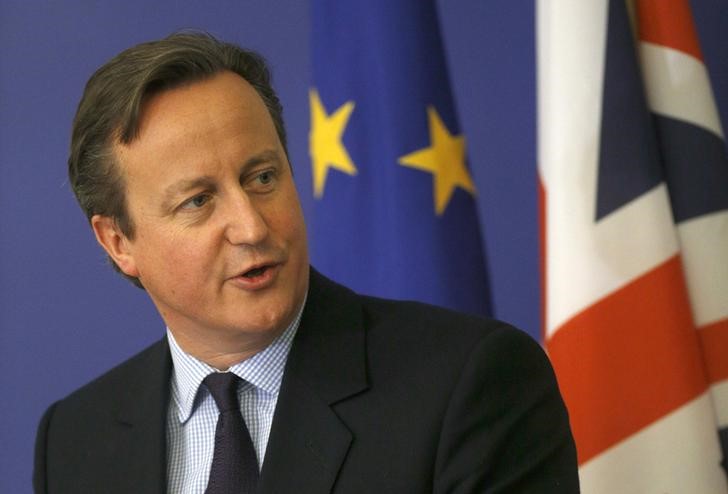By Elizabeth Piper and Alastair Macdonald
BRUSSELS (Reuters) - Prime Minister David Cameron will try to end an impasse at talks with European Union leaders on Thursday over his attempts to win better membership terms for Britain before it votes on whether to stay in the bloc.
The British leader has characterised the talks over dinner in Brussels as "another step" in negotiations, but is keenly aware of how divisive the debate is at home before a membership referendum he has promised to hold by the end of 2017.
Cameron faces an uphill battle to secure agreement on curbing welfare payments to EU migrants to try to reduce immigration in talks which the EU's main negotiator, Donald Tusk, said could not "escape a serious debate with no taboos".
European Commission chief Jean-Claude Juncker said he was convinced EU leaders would find a solution to "that highly complicated question" of benefits, which Cameron said he must secure to ease concerns among British voters over immigration.
"We'll enter the concrete and vital phase of negotiations with our British colleagues," he told reporters. "The Commission is ready to look for other options than the single one proposed by the British prime minister."
Tusk, who will chair the evening's summit talks, said: "The consultations I have led with all member states show goodwill of all the parties involved but it doesn't change the fact that some parts of the British proposal seem unacceptable.
"However, if Prime Minister Cameron persuades leaders tonight that we can work together to find solutions ... then we will have a real chance to strike a deal in February."
Cameron has been touring capitals to drum up support for demands that he says will soothe British fears over the EU and help convince people to stay in the bloc. A British government official said he would hold talks right up to the dinner.
Cameron has won encouragement from German Chancellor Angela Merkel, Europe's main powerbroker, and other leaders who want to keep Britain in the bloc. He has also got sympathy for his calls for greater competition in the EU, more sovereignty for Britain and safeguards for the City of London financial centre.
But his proposal to make immigrants from the other 27 EU states wait four years before claiming "in-work" benefits in Britain - payments to people in lower paid jobs to make work more attractive - has been roundly criticised, especially in eastern Europe, for breaking EU law banning discrimination.
ON THE TABLE
Drawing the European Union's focus to a small part of Britain's welfare system has raised eyebrows among some leaders who are trying to hammer out a deal to house hundreds of thousands of refugees from the Middle East and Africa.
The British official said the four-year proposal was the only one on the table before the meeting, but the prime minister was eager to hear whether other leaders had alternative suggestions to help control migration to Britain better.
"The main thing we need to get out of the European Council on Thursday evening is an agreement that we should work on either developing the four-year proposal ... or on other solutions," the official said.
Diplomats said Cameron will also emphasise that some of the solutions he wants will need change to treaties, probably via binding promises rather than forcing states to ratify such changes in tricky national votes any time soon. [L8N1453P3]
The British government hopes the dinner will signal a political will to accelerate more technical talks on how London's demands can be made legally watertight in the EU to try to meet Tusk's ambition to reach agreement in February.
An agreement early next year could give Cameron enough time to stage the referendum in June, seen by some analysts as an advantageous time before summer. That's when migrants fleeing conflict and poverty in Africa and the Middle East may start making the treacherous journey to Europe.
Britons are split over membership of the European Union. The 'out' campaign seems to be gaining the upper hand with many people who are fearful of increased immigration and put off by how the bloc has dealt with this year's migrant crisis.
Former prime minister John Major made his argument for staying in the EU on the eve of the summit, saying any departure would leave Britain in dangerous "splendid isolation" and could lead to the break up of the country.

"I am sceptical of a great deal of European Union policy but flirting with leaving at a moment when the whole world is coming together seems to me to be very dangerous," Major, Conservative prime minister from 1990 to 1997, told BBC Radio.